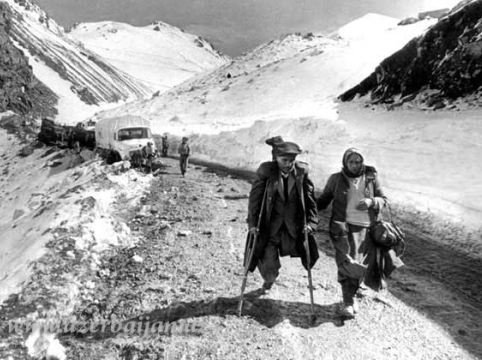Armenian general holds Azerbaijanis in slavery for years

By Sara Rajabova
An Armenian general has come under harsh criticism by human rights activists for violating the Geneva Conventions after he admitted he had private hostages during the Karabakh war.
Human rights activist Artur Sakunts said regardless of the ratification of these conventions, nobody, including a war party has the right to keep a prisoner at his home.
"It is a gross violation of international law," he said.
Former Deputy Defense Minister Manvel Grigorian, who is also a member of the ruling Republican Party's faction in the Armenian parliament, said in an interview with RFE/RL's Armenian Service (Azatutyun.am) that he returned Armenia after the war with hundreds of prisoners.
Grigorian said he had kept one of these hostages in his own home for four years, which is a gross violation of the international law. "I kept a captive named Simon (the name given to the captive by Grigoryan) for four years, two years in Martakert, and two years in Armenia."
In reply to the remarks that the Azerbaijani captive was only 15-16 years then, Grigoryan tried to justify his illegal act by saying that he was allegedly "from special forces and a trained fighter."
Another human right activist, Larisa Alaverdian also agreed that keeping a hostage at home is a violation of international law.
Lack of legal norms is a reality in the Armenian army, as they don't even show mercy for the innocent children and old people.
Under the Geneva Conventions, the parties commit themselves to keeping prisoners of war under their control. According to the Convention, individuals have no right to keep prisoners of war at their homes or other locations. Armenia ratified the Conventions in 1992 before the end of the bloody war.
As of November 1, 2014, the number of Azerbaijanis taken captive, hostage, or being lost stood at 4,016 including 3,256 servicemen and 758 civilians. And it's unknown whether the remaining two were civilians or servicemen.
Among the missing civilians, 59 are children (17 girls), 254 women, and 351 elderly people (154 women). Among 4,016 people who have gone missing, 877 are reported to have been taken either captive or hostage. During the conflict, 1,419 people were released (347 female, 1,072 male, including 207 children, 287 elderly people).
The analysis of data received by the Azerbaijani State Commission on Prisoners of War, Hostages and Missing Persons showed that 554 people (104 women, 449 men) were found out to have either been killed in captivity or died of various reasons. Among them, only the names of 137 people are known, while 75 others have not yet been identified.
The bloody war, which flared up in the late 1980s due to Armenia's territorial claims against its South Caucasus neighbor, left displaced thousands of Azerbaijani civilians of Nagorno-Karabakh and the regions adjoining it, as well as the regions bordering with Armenia and Nagorno-Karabakh.
Moreover, 250,000 Azerbaijanis were expelled from Armenia and became refugees due to Armenia's ethnic cleansing policy after the emergence of the Nagorno-Karabakh conflict with Azerbaijan.
The Azerbaijanis who had displaced from their homes as a result of the brutal war were forced to live in refugee camps, tents and wagons in very difficult conditions. They are temporarily settled in more than 1,600 settlements across 62 cities and regions of Azerbaijan.
As a result of the military aggression of Armenia, over 20,000 Azerbaijanis were killed, almost 100,000 were injured, and 50,000 were disabled.
The UN Security Council has passed four resolutions on Armenian withdrawal from the Azerbaijani territory, but they have not been enforced to this day.
Here we are to serve you with news right now. It does not cost much, but worth your attention.
Choose to support open, independent, quality journalism and subscribe on a monthly basis.
By subscribing to our online newspaper, you can have full digital access to all news, analysis, and much more.
You can also follow AzerNEWS on Twitter @AzerNewsAz or Facebook @AzerNewsNewspaper
Thank you!
